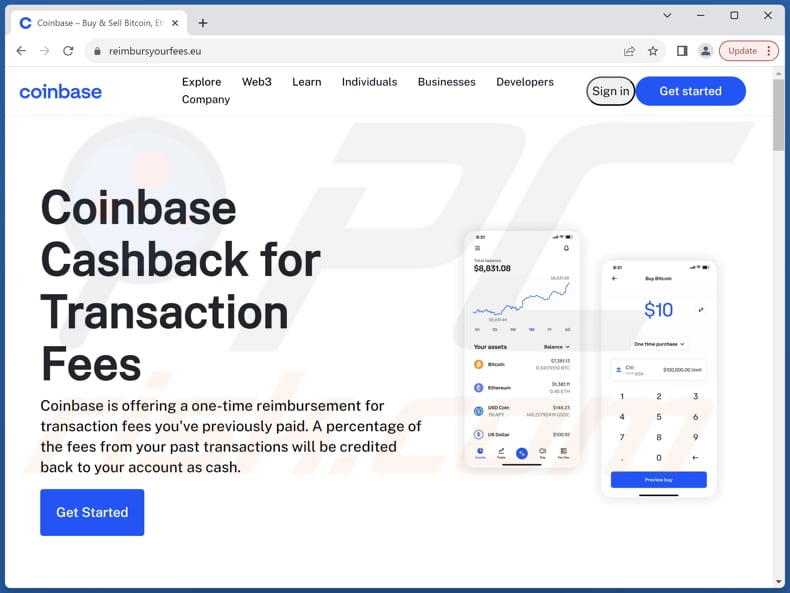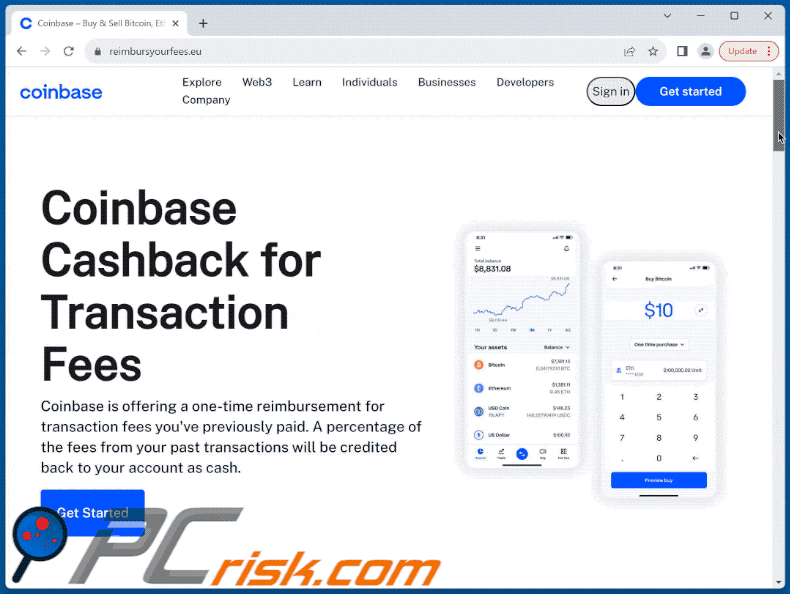How to identify fraudulent schemes like "Coinbase Cashback"
![]() Written by Tomas Meskauskas on
Written by Tomas Meskauskas on
What kind of scam is "Coinbase Cashback"?
Our analysis has determined that this is a fraudulent scheme posing as a platform for obtaining reimbursement for transaction fees. Scammers exploit the reputation of a reputable service like Coinbase to deceive individuals into taking actions that could compromise their cryptocurrency wallets.

"Coinbase Cashback" scam in detail
The scammers are posing as Coinbase, a well-known cryptocurrency platform, and claiming to offer users a one-time reimbursement for transaction fees. The promise of crediting a percentage of past transaction fees back to the user's account as cash serves as bait to entice individuals into taking action.
This deceptive scheme is crafted to manipulate users into approving a malicious contract, with the ultimate objective of pilfering their cryptocurrency. Adhering to the given instructions ("connecting" a wallet) leads to the approval of a strategically devised malicious contract set to initiate a cryptocurrency drainer.
The purpose of this drainer is specifically to siphon cryptocurrency from wallets. When activated, the drainer enables the transfer of digital currency from the targeted wallet to the perpetrator's wallet. It is important to note that cryptocurrency transactions are generally irreversible, making it challenging to trace and recover funds once the transfer has occurred.
Usually, scams related to cryptocurrency drainers, like the one discussed here, are advertised in posts on X (formerly Twitter). These posts are commonly written using hacked accounts linked to various organizations, companies, or celebrities.
| Name | Coinbase Cashback fake reimbursment for transaction fees |
| Threat Type | Phishing, Scam, Social Engineering, Fraud |
| Fake Claim | Participants can receive a one-time reimbursement for transaction fees |
| Disguise | Legitimate offer from Coinbase |
| Related Domain | reimbursyourfees[.]eu |
| Detection Names | Avira (Phishing), Combo Cleaner (Phishing), ESET (Phishing), Kaspersky (Phishing), Sophos (Phishing), Full List Of Detections (VirusTotal) |
| Symptoms | Lack of official verification, unrealistic claims, too good-to-be-true promises. |
| Distribution methods | Post on X (Twitter), deceptive websites, rogue online pop-up ads, unwanted applications. |
| Damage | Loss of sensitive private information, monetary loss, identity theft, possible malware infections. |
| Malware Removal (Windows) | To eliminate possible malware infections, scan your computer with legitimate antivirus software. Our security researchers recommend using Combo Cleaner. |
Similar scams in general
In conclusion, scams involving cryptocurrency drainers frequently utilize social media platforms like X to disseminate deceptive information through compromised accounts associated with reputable organizations or figures. These scams prey on users' trust and lack of suspicion, enticing them to follow instructions that ultimately lead to the activation of malicious contracts.
Awareness of such tactics, cautious online behavior, and verification of information sources are crucial in safeguarding against falling victim to these prevalent cryptocurrency scams. Examples of similar scams are "Gasfees Airdrop", "AppleCoin", and "Binance x MetaMask Partnership".
How did I open a scam website?
Users often find themselves on fraudulent websites by clicking phishing email links or falling for deceptive advertisements or fake software updates. Scammers also employ typosquatting, manipulation of search engine results, and social media to lure users into visiting sites hosting scams.
In some instances, users end up on dubious sites when engaging with notifications from untrustworthy pages, ads delivered via adware, and websites using rogue advertising networks, such as illegal movie streaming pages, torrent sites, and similar pages.
Scams like the one described in our article are often promoted through deceptive posts on X (Twitter), written using stolen or compromised accounts.
How to avoid visiting scam pages?
Exercise caution when opening links, especially those received in unsolicited emails or messages. Verify the legitimacy of the sender and check the URL before clicking. Be wary of misleading advertisements and refrain from engaging with pop-ups or banners that seem suspicious. Keep your software and antivirus programs updated to protect against vulnerabilities that scammers may exploit.
Additionally, use reputable search engines and avoid downloading software or files from unfamiliar websites. If your computer is already infected with unwanted apps, we recommend running a scan with Combo Cleaner Antivirus for Windows to automatically eliminate them.
The appearance of "Coinbase Cashback" scam (GIF):
 \
\
Message on this page:
Coinbase Cashback for Transaction Fees
Coinbase is offering a one-time reimbursement for transaction fees you've previously paid. A percentage of the fees from your past transactions will be credited back to your account as cash.Get Started
Instant automatic malware removal:
Manual threat removal might be a lengthy and complicated process that requires advanced IT skills. Combo Cleaner is a professional automatic malware removal tool that is recommended to get rid of malware. Download it by clicking the button below:
▼ DOWNLOAD Combo Cleaner
By downloading any software listed on this website you agree to our Privacy Policy and Terms of Use. To use full-featured product, you have to purchase a license for Combo Cleaner. 7 days free trial available. Combo Cleaner is owned and operated by Rcs Lt, the parent company of PCRisk.com read more.
Quick menu:
- What is Coinbase Cashback fake reimbursment for transaction fees?
- How to identify a pop-up scam?
- How do pop-up scams work?
- How to remove fake pop-ups?
- How to prevent fake pop-ups?
- What to do if you fell for a pop-up scam?
How to identify a pop-up scam?
Pop-up windows with various fake messages are a common type of lures cybercriminals use. They collect sensitive personal data, trick Internet users into calling fake tech support numbers, subscribe to useless online services, invest in shady cryptocurrency schemes, etc.
While in the majority of cases these pop-ups don't infect users' devices with malware, they can cause direct monetary loss or could result in identity theft.
Cybercriminals strive to create their rogue pop-up windows to look trustworthy, however, scams typically have the following characteristics:
- Spelling mistakes and non-professional images - Closely inspect the information displayed in a pop-up. Spelling mistakes and unprofessional images could be a sign of a scam.
- Sense of urgency - Countdown timer with a couple of minutes on it, asking you to enter your personal information or subscribe to some online service.
- Statements that you won something - If you haven't participated in a lottery, online competition, etc., and you see a pop-up window stating that you won.
- Computer or mobile device scan - A pop-up window that scans your device and informs of detected issues - is undoubtedly a scam; webpages cannot perform such actions.
- Exclusivity - Pop-up windows stating that only you are given secret access to a financial scheme that can quickly make you rich.
Example of a pop-up scam:

How do pop-up scams work?
Cybercriminals and deceptive marketers usually use various advertising networks, search engine poisoning techniques, and shady websites to generate traffic to their pop-ups. Users land on their online lures after clicking on fake download buttons, using a torrent website, or simply clicking on an Internet search engine result.
Based on users' location and device information, they are presented with a scam pop-up. Lures presented in such pop-ups range from get-rich-quick schemes to fake virus scans.
How to remove fake pop-ups?
In most cases, pop-up scams do not infect users' devices with malware. If you encountered a scam pop-up, simply closing it should be enough. In some cases scam, pop-ups may be hard to close; in such cases - close your Internet browser and restart it.
In extremely rare cases, you might need to reset your Internet browser. For this, use our instructions explaining how to reset Internet browser settings.
How to prevent fake pop-ups?
To prevent seeing pop-up scams, you should visit only reputable websites. Torrent, Crack, free online movie streaming, YouTube video download, and other websites of similar reputation commonly redirect Internet users to pop-up scams.
To minimize the risk of encountering pop-up scams, you should keep your Internet browsers up-to-date and use reputable anti-malware application. For this purpose, we recommend Combo Cleaner Antivirus for Windows.
What to do if you fell for a pop-up scam?
This depends on the type of scam that you fell for. Most commonly, pop-up scams try to trick users into sending money, giving away personal information, or giving access to one's device.
- If you sent money to scammers: You should contact your financial institution and explain that you were scammed. If informed promptly, there's a chance to get your money back.
- If you gave away your personal information: You should change your passwords and enable two-factor authentication in all online services that you use. Visit Federal Trade Commission to report identity theft and get personalized recovery steps.
- If you let scammers connect to your device: You should scan your computer with reputable anti-malware (we recommend Combo Cleaner Antivirus for Windows) - cyber criminals could have planted trojans, keyloggers, and other malware, don't use your computer until removing possible threats.
- Help other Internet users: report Internet scams to Federal Trade Commission.
Frequently Asked Questions (FAQ)
What is a crypto scam?
A crypto scam refers to fraudulent schemes or deceptive activities in the cryptocurrency space, where scammers engage in misleading practices to exploit others for financial gain.
What is the purpose of a crypto scam?
The purpose of a crypto scam is to fraudulently obtain cryptocurrency (e.g., manipulate individuals into making financial transactions under false pretenses) or steal personal information.
Why do I encounter crypto scams?
To ensnare individuals, scammers utilize diverse strategies, including the creation of counterfeit social media profiles, deceptive pages, unreliable advertisements, adware-type apps, notifications from shady sites, and comparable channels.
Will Combo Cleaner protect me from scam pages?
Combo Cleaner possesses the ability to perform thorough scans of all visited websites, efficiently detecting malicious sites, including those associated with scams. The application promptly alerts users and restricts access to unreliable websites.


▼ Show Discussion